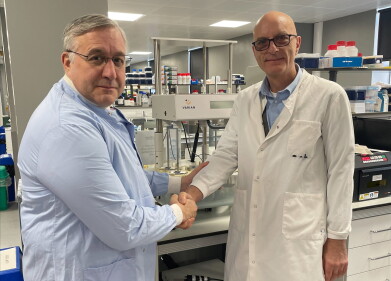News
Collaborative Support for India LIGO Project
Feb 05 2018
An agreement focused on building research capacity using gravitational wave detector technology in India, has been officially signed by a consortium of universities led by IUCAA (Inter-University Centre for Astronomy and Astrophysics) in Pune and a consortium of UK universities led by the University of Glasgow.
The LIGO India partnership, funded by the STFC through its Newton-Bhabha project, will support the building of the third LIGO detector in India following the original two detectors in the USA. The collaboration has also opened the pathway for creation of business spin-offs through the use of the technology, as well as for a research structure that will support training of students, early career researchers and exchange programmes.
UK project lead, Glasgow University based Professor Giles Hammond, said: “The UK has a proven track record in delivering high-quality technology and outreach activities relating to gravitational wave science, including the delivery of key hardware for the LIGO mirror suspensions. A model of sharing knowledge via staff, postdoc and student exchanges to the UK, together with trips to Indian institutes, will strengthen and benefit the UK and Indian academic communities, providing high quality training of the next generation of scientists and engineers.”
Professor Somak Raychaudhury, Director of the IUCAA Pune, lead university in the programme in India, said: “With the siting of the 3rd Advanced LIGO detector in India there is an essential need for critically skilled students, postdocs and early career researchers to be trained at the highest level in Gravitational Wave astronomy, for construction of the infrastructure/technology & data pipelines. In turn, the LIGO India project will help the Indian scientific/community to be a major player in the emerging research frontier of GW astronomy.”
Professor Bala Iyer (ICTS, TIFT Bangalore), Council chair of LIGO India, said: “During the course of this Newton fund proposal we aim to work with our colleagues in the UK to build-up key infrastructure within India, to train the next generation of scientists and engineers. This includes the development of a 10m prototype interferometer to test key technologies and future upgrade scenarios to Advanced LIGO. Our vision is to build a connected international network, enabling India to host the most sensitive of the international gravitational wave detectors.”
Digital Edition
Lab Asia 32.2 April
April 2025
Chromatography Articles - Effects of small deviations in flow rate on GPC/SEC results Mass Spectrometry & Spectroscopy Articles - Waiting for the present to catch up to the future: A bette...
View all digital editions
Events
Apr 09 2025 Tokyo, Japan
Apr 22 2025 Hammamet, Tunisia
Apr 22 2025 Kintex, South Korea
Analytica Anacon India & IndiaLabExpo
Apr 23 2025 Mumbai, India
Apr 23 2025 Moscow, Russia



















